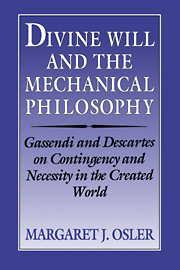 Divine Will and the Mechanical Philosophy
Divine Will and the Mechanical Philosophy Book contents
- Frontmatter
- Contents
- Acknowledgments
- Introduction
- Part I Theology and the philosophy of nature
- 1 Divine power and divine will in the Middle Ages: Historical and conceptual background
- 2 Baptizing Epicurean philosophy: Gassendi on divine will and the philosophy of nature
- 3 Providence and human freedom in Christian Epicureanism: Gassendi on fortune, fate, and divination
- 4 Theology, metaphysics, and epistemology: Gassendi's “science of appearances”
- 5 Eternal truths and the laws of nature: The theological foundations of Descartes' philosophy of nature
- 6 Gassendi and Descartes in conflict
- Part II The mechanical philosophy and the formation of scientific styles
- Bibliography
- Index
2 - Baptizing Epicurean philosophy: Gassendi on divine will and the philosophy of nature
Published online by Cambridge University Press: 11 September 2009
- Frontmatter
- Contents
- Acknowledgments
- Introduction
- Part I Theology and the philosophy of nature
- 1 Divine power and divine will in the Middle Ages: Historical and conceptual background
- 2 Baptizing Epicurean philosophy: Gassendi on divine will and the philosophy of nature
- 3 Providence and human freedom in Christian Epicureanism: Gassendi on fortune, fate, and divination
- 4 Theology, metaphysics, and epistemology: Gassendi's “science of appearances”
- 5 Eternal truths and the laws of nature: The theological foundations of Descartes' philosophy of nature
- 6 Gassendi and Descartes in conflict
- Part II The mechanical philosophy and the formation of scientific styles
- Bibliography
- Index
Summary
As for the Epicurean Commentaries, you seem to hesitate lest I go wrong in religion. But I am opposed to anything which could conflict with it. You insist on Providence: truly I defend it against Epicurus.
Gassendi to Tommaso Campanella, November 1632Gassendi's Epicurean project
Pierre Gassendi is most frequently remembered for introducing the philosophy of the ancient atomist Epicurus into the mainstream of European thought. His revival of Epicureanism can be understood in the context of the early-seventeenth-century search for a new philosophy of nature. The young Gassendi was an active member of the intellectual community of Provence and, eventually, all of France. He conducted experiments and discussed many scientific topics, particularly in astronomy, with his patron and correspondent, Nicolas-Claude Fabri de Peiresc (1580–1637). He was a friend of Hobbes, whom he encountered in the circle around Mersenne in Paris. He corresponded with Beeckman, Galileo, Hevelius, and other astronomers and natural philosophers. He performed the famous experiment of dropping a heavy object from the top of a moving ship's mast, an experiment previously imagined by Galileo as proving the possibility of the earth's motion. And he wrote a treatise defending Galileo's new science of motion, De motu impresso a motore translato (1642). As an active member of this community of natural philosophers, Gassendi predictably rejected the philosophy of Aristotle. There is evidence that he was interested in Epicureanism as a replacement for Aristotelianism from at least the mid-1620s.
- Type
- Chapter
- Information
- Divine Will and the Mechanical PhilosophyGassendi and Descartes on Contingency and Necessity in the Created World, pp. 36 - 79Publisher: Cambridge University PressPrint publication year: 1994


